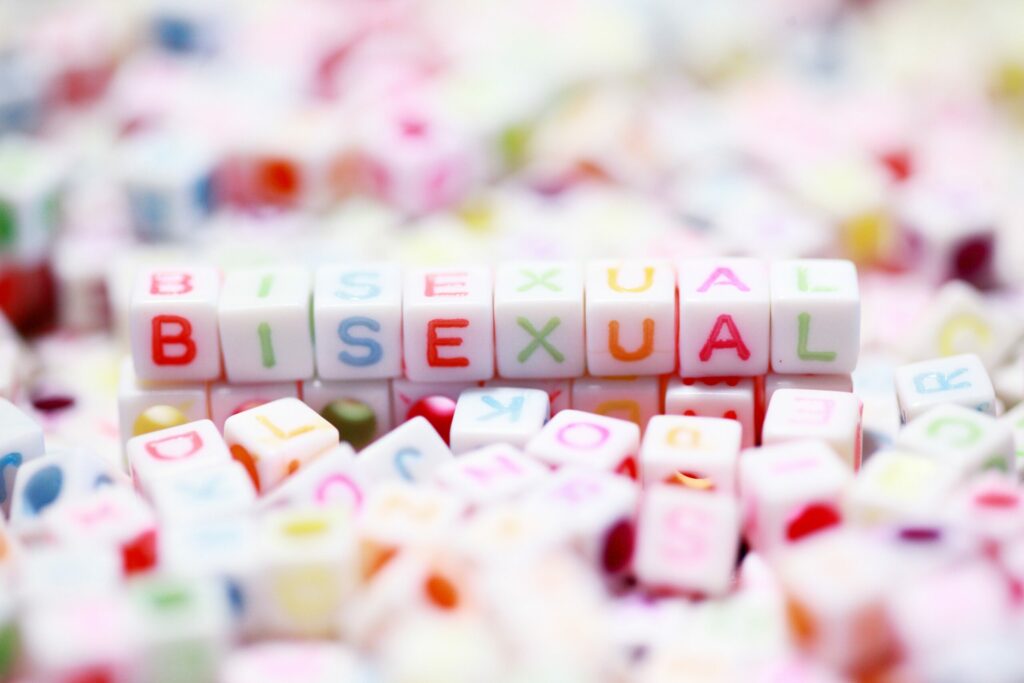If you identify as bisexual, there’s a good chance you’ve either encountered or are already familiar with biphobia. Biphobia is prejudice against or dislike of bisexual people, and it comes in many different, often less obvious, forms. This form of homophobia can look anything like invalidating the existence of bisexuality to stereotyping the bi community in negative ways.
Let’s break down this phenomenon a little further, and also talk about some ways to combat this issue that is still very prevalent in both the straight and queer communities.
Download HER app
Monosexism Broken Down
Biphobia, also known as monosexism, is the belief that monosexuality, or being attracted to one gender, is the most superior and valid sexuality. Biphobia has real negative impacts on the bisexual community, including effects on mental, physical, and sexual health.
Some examples of biphobia include:
- Invalidating bisexuality as a real sexuality.
- Invalidating the queerness of bisexual individuals.
- Viewing bisexual people as sexually promiscuous or ‘attracted to everyone’.
- Stereotyping bi individuals as more likely to cheat on their partners.
- Invalidating bisexual people as being queer when in straight-presenting relationships.
- Assuming bisexual people have a preference toward the opposite gender and will “end up with them anyways”.
- Assuming bi people are actually just gay and “lying to themselves,” etc.
Sound familiar yet? Unfortunately, many bisexual people still experience these types of biphobia from both straight and LGBTQIA+ communities. Although we have come a long way in accepting and understanding gay and lesbian people, acceptance of bisexual people has progressed at a slower rate.
A Sexualized Sexuality
In addition to these prejudices, bisexual people face hyper-sexualization. Bisexual women, in particular, may be fetishized for their sexuality by straight men. This is partially caused by the stereotype that bisexual people are more promiscuous, leading people to presume that bisexual women and men are more likely to fulfill certain fantasies like threesomes.
Women in our society already face enough sexualization and objectification, and unfortunately bisexual, and lesbian, women can encounter even more. Objectification is harmful– it dehumanizes people and communities, justifying oppression, harm, and inequality. Thus, it’s important for the queer community to recognize the ways we contribute to biphobia and learn how to be more supportive.
According to the CDC’s National Intimate Partner and Sexual Violence study, 61% of bisexual women have experienced sexual assault, physical violence, and/or stalking by an intimate partner in their lifetime, compared to 44% of lesbian women and 35% of heterosexual women.
Biphobia often gets dismissed as a less serious form of homophobia – however, it is a real issue that needs to be discussed more in the queer community!
A Dismissed Sexuality
In addition to people over-sexualizing bisexual people, many also dismiss bisexuality as a valid identity altogether. This is called bisexual erasure. For example, when men come out as bisexual, they often get labeled as actually gay and “in denial,” etc. On the flip side, when women come out as bisexual, some may perceive them as being actually straight. These people may think, “Surely they only want to, maybe, experiment with the same sex, but they will still end up with a man regardless.”
Why is it that it’s so hard for people to believe bisexual women when they say they are bisexual? Some might argue it’s more difficult for a patriarchal society to understand why a woman wouldn’t be attracted to or desire to be with a man.
In fact, the only times some biphobic individuals actually express the validity of bisexuality is when a woman claims she’s lesbian. Clearly, the dismissal of bisexuality, until it may be convenient, is a prevalent issue that we need to address in the LGBTQIA+ community and beyond.
Another form of bi-erasure is when people invalidate bisexual people’s queerness when they are in an opposite-sex relationship. Particularly with bisexual women, their sexuality is often invalidated if they are dating a man– “See, we knew you would just end up with a man anyways,” or, “We knew you were actually straight.”
It’s important for the queer community to acknowledge that just because someone is in a straight-presenting relationship doesn’t mean they are no longer bisexual or queer, and they are still likely to experience discrimination for their sexuality.
Unfortunately, this prejudice is still prevalent within the LGBTQIA+ community. Many people in the queer community believe that it’s not possible to be attracted to more than one gender, and essentially that bisexual people are not really bisexual.
Many straight and queer folks believe that ‘bisexuality’ is not real, and it is either a phase, a stepping stone to only liking one gender, or even just a lie. This sometimes comes from a place of fear that bisexuality invalidates lesbian and gay identities, and it may damage the rights the LGBT community has gained.
Biphobia is a serious issue that has real, negative consequences for the bisexual community. As a marginalized community, we need to do our part in supporting and validating all of our fellow queer folks!
Internalized Biphobia
As a result of existing in a biphobic society, it’s common for bisexual individuals to experience internalized biphobia as well. Internalized biphobia is when bisexual people apply stereotypes about the bisexual community to themselves and others.
Those with internalized biphobia may also fall for some or all of the stereotypes we mentioned, which can lead to bisexual people feeling negative about themselves and can lead to mental health issues.
What to Do About It
There is so much we can do to combat biphobia, both within ourselves and our community. Some strategies include:
- Acknowledging that biphobia is real and prevalent.
- Not being a bystander to hate crimes.
- Addressing biphobia within our own communities.
- Believing people when they say they’re experiencing biphobia.
- Being a safe space for bisexual people.
- Acknowledging that bisexuality is real and a valid identity.
- Understanding that although some people who come out as bisexual later come out as gay, bisexuality still exists.
- Taking a look within and recognizing any perceptions we have about bisexuality.
If you’ve gotten this far, we’re proud of you for educating yourself a little more about biphobia! If you have experienced biphobia, know there are people who do validate your identity and want to support you.
HER is the dating app for connecting LGBTQIA+ women and nonbinary folks. Find your safe and accepting community today with HER– there are so many people out there waiting to support and love you for exactly who you are!
Download HER app





